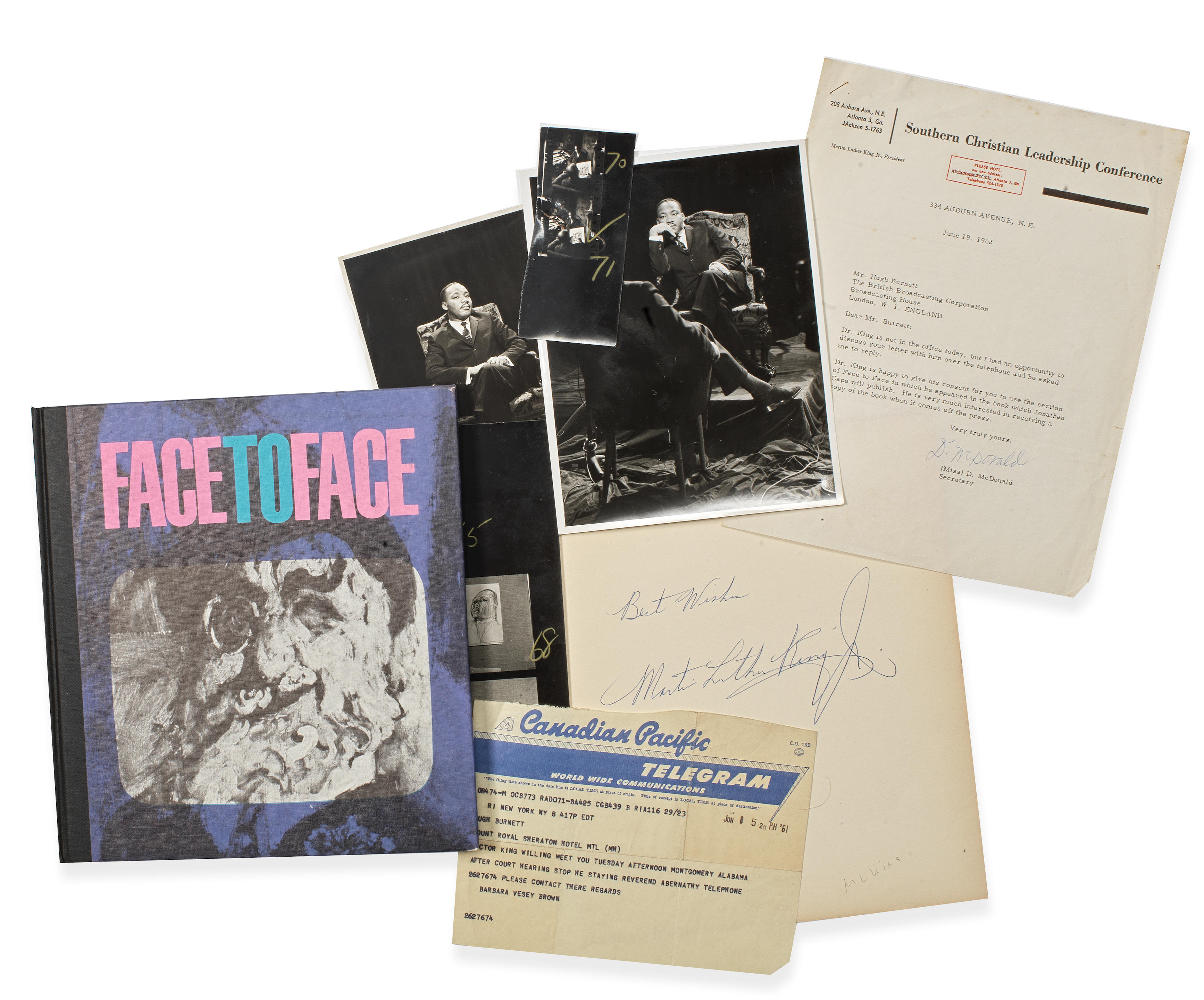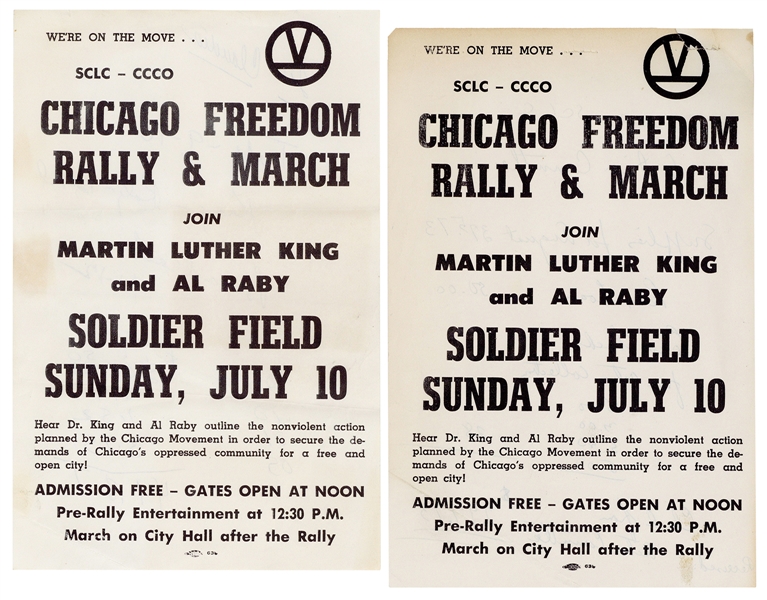KING, Martin Luther, Jr. (1925-1968), Clergyman, Civil Rights leader . Typed letter signed ("Martin Luther King, Jr."), Atlanta, 30 April 1964. 1 page, 4to, Southern Christian Leadership Conference stationery, three punch holes at left margin .
KING, Martin Luther, Jr. (1925-1968), Clergyman, Civil Rights leader . Typed letter signed ("Martin Luther King, Jr."), Atlanta, 30 April 1964. 1 page, 4to, Southern Christian Leadership Conference stationery, three punch holes at left margin . KING HAILS A JEWISH CLERIC AS A "TALL OAK IN THE RELIGIOUS LIFE OF OUR NATION" in this 1964 letter to Paul Press, of the Congregation Mishkan Israel in Hamden, Connecticut. King asks Press to "please extend my heartiest congratulations to my friend, Rabbi Robert E. Goldburg, on the occasion of his 15th anniversary as the spiritual leader of Mishkan Israel. He has proved to be a tall oak in the religious life of our nation. In a significant way, he has made the insights of the prophets relevant in the contemporary social situation. His genuine good will, deep humanitarian concern, and his unswerving devotion to the cause of freedom and human dignity will remain an inspiration to generations yet unborn. I hope for Rabbi Goldburg and the whole congregation of Mishkan Israel many more years of creative fulfillment." The bond between King and Goldburg was forged in October 1960, when the Rabbi invited King to speak at the congregation's newly opened temple. King's arrest and incarceration in the Birmingham jail prevented his attendance (but inspired one of King's most famous statements on racial equality). Not until the following October was King able to visit Connecticut, and every year since, the congregation has celebrated a special Martin Luther King Day by inviting clergy of different faiths to come and speak. King writes this letter in the midst of the great Congressional battle over the 1964 Civil Rights Act. President Johnson urged Congress to pass it as a memorial to his slain predecessor, John F. Kennedy. The House promptly passed it in February, but it still took months of wrangling to overcome Southern resistance in the Senate. Not until 2 July did the Act become law. The Voting Rights Act of 1965 would come the following year. A crucial part of these successes was the broad ecumenical support King engendered.
KING, Martin Luther, Jr. (1925-1968), Clergyman, Civil Rights leader . Typed letter signed ("Martin Luther King, Jr."), Atlanta, 30 April 1964. 1 page, 4to, Southern Christian Leadership Conference stationery, three punch holes at left margin .
KING, Martin Luther, Jr. (1925-1968), Clergyman, Civil Rights leader . Typed letter signed ("Martin Luther King, Jr."), Atlanta, 30 April 1964. 1 page, 4to, Southern Christian Leadership Conference stationery, three punch holes at left margin . KING HAILS A JEWISH CLERIC AS A "TALL OAK IN THE RELIGIOUS LIFE OF OUR NATION" in this 1964 letter to Paul Press, of the Congregation Mishkan Israel in Hamden, Connecticut. King asks Press to "please extend my heartiest congratulations to my friend, Rabbi Robert E. Goldburg, on the occasion of his 15th anniversary as the spiritual leader of Mishkan Israel. He has proved to be a tall oak in the religious life of our nation. In a significant way, he has made the insights of the prophets relevant in the contemporary social situation. His genuine good will, deep humanitarian concern, and his unswerving devotion to the cause of freedom and human dignity will remain an inspiration to generations yet unborn. I hope for Rabbi Goldburg and the whole congregation of Mishkan Israel many more years of creative fulfillment." The bond between King and Goldburg was forged in October 1960, when the Rabbi invited King to speak at the congregation's newly opened temple. King's arrest and incarceration in the Birmingham jail prevented his attendance (but inspired one of King's most famous statements on racial equality). Not until the following October was King able to visit Connecticut, and every year since, the congregation has celebrated a special Martin Luther King Day by inviting clergy of different faiths to come and speak. King writes this letter in the midst of the great Congressional battle over the 1964 Civil Rights Act. President Johnson urged Congress to pass it as a memorial to his slain predecessor, John F. Kennedy. The House promptly passed it in February, but it still took months of wrangling to overcome Southern resistance in the Senate. Not until 2 July did the Act become law. The Voting Rights Act of 1965 would come the following year. A crucial part of these successes was the broad ecumenical support King engendered.















Try LotSearch and its premium features for 7 days - without any costs!
Be notified automatically about new items in upcoming auctions.
Create an alert